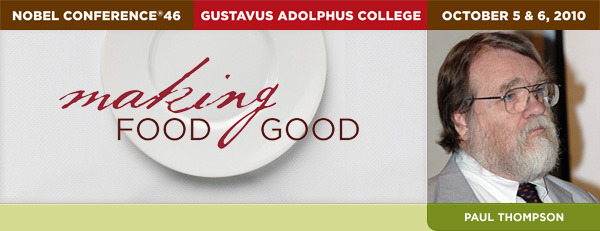|
Debates about what is "good" about food very quickly diverge from determining what dish tastes good to problems with more thorny considerations: "Should I buy organic to protect my health, or that of farm workers?" "If we don't use pesticides, will we be able produce enough food for the world?" "Is my locally grown apple really sustainable if migrant laborers pick it?"
Behind these questions, and many others like it, are ethical frameworks that weigh different kinds of "good" in ethical scales, just as the farmer weighs your vine-ripened tomatoes at the farmers' market. Our claims of superiority for types of food, and our ways of producing it, are often based on assertions that appeal to our emotional senses of right and fairness. "There is a famine, we have to provide food now," even if providing that food aid perpetuates the cycle of famine. "We can't possibly ban Genetically Modified Organisms," which might produce more food for starving people, even though the problem of hunger is often not a problem of quantity, but access. Surprisingly, we rarely stop to give thoughtful consideration to the ethical underpinnings of our arguments.
In response to our "hastily chewed and swallowed" consumption of ethical arguments, Dr. Paul Thompson brings an agricultural ethicist's perspective to this year's Nobel Conference. Thompson is the W. K. Kellogg Professor of Agricultural, Food and Community Ethics at Michigan State University. In his teaching and writing, he addresses the ethical and moral underpinnings of how we think (and act) about food and agriculture. We hope that you can join us on October 5 & 6, 2010, at Nobel Conference 46 to hear more about the ethical issues of "good food" from Professor Thompson.
|

